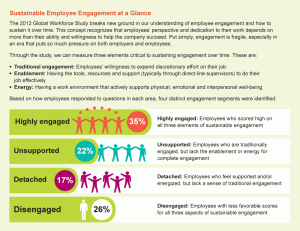by Charles Plant | Oct 4, 2012 | Literature Review
While Sam Walton was a great believer in identifying weaknesses, he didn’t focus on them. Yesterday’s blog was not meant to advocate a focus on weaknesses, just to say that ignoring them is not productive. In fact, what you want to focus on are strengths.
The book, Strengths Finder by Tom Rath lays out the findings from some great research done by the Gallup organization on employee engagement.

Make today a Strengths day. Go out and compliment a few people today.
by Charles Plant | Sep 11, 2012 | Literature Review
Are you really engaged in your job? Chances are good that you aren’t. Well, Towers Watson just released Their 2012 Global Workforce Study. According to the study, 65% of you are not highly engaged at work. That would make employee engagement one of the biggest problems for companies these days.
“For optimal engagement in the modern workplace, employers must create a combination of discretionary effort (the willingness to work extra hard), enablement (the capability to excel), and energy (the capacity to maintain efforts over time). Old methods focused solely on discretionary effort, but any organization that wants to yield a significant performance advantage must combine all three elements to forge sustainable engagement.”
While this is a bad thing for you and probably for your employer, it might not be a bad thing for the economy. According to another source, a blog on HBR:
“What do 70% of successful entrepreneurs have in common? They all incubated their business ideas while employed by someone else. Indeed, most people start their own companies — or go freelance — in order to stop working for others. Why? Because most managers are simply unbearable. Year after year, Gallup reports that most employees are unhappy at work, and that the number one reason for dissatisfaction is their boss.”
So if you’re not engaged, what are you doing with your time? If it’s because your manager is unbearable then get moving. Find another job or better yet, create one yourself and free yourself from the tyranny of bad bosses.
by Charles Plant | Jul 9, 2012 | Leadership Development, Literature Review
 McKinsey has done some interesting research and written a great article on how leaders kill meaning at work. I had a conversation recently with a friend who is a recruiter and we were discussing (not gossiping) about a variety of people we know who are serial tormenters. They go from job to job, tormenting new people at every organization. The recruiting system must be broken if this keeps going on. I guess they get good references from current employers in the hopes that they’ll leave.
McKinsey has done some interesting research and written a great article on how leaders kill meaning at work. I had a conversation recently with a friend who is a recruiter and we were discussing (not gossiping) about a variety of people we know who are serial tormenters. They go from job to job, tormenting new people at every organization. The recruiting system must be broken if this keeps going on. I guess they get good references from current employers in the hopes that they’ll leave.
The funny thing is that the serial tormenters I know don’t even realize that they are doing it. They seem to think everyone else is doing something wrong. Where do serial tormenters come from? Are serial tormenters born or are they made? Do they learn from being tormented themselves? Great research ideas if anyone out there has time.
Ask yourself: Do you work for a serial tormenter? Could you be one yourself? Would you know it if you were one?
YZ3324YGP355
by Charles Plant | Jun 19, 2012 | Leadership Development, Literature Review
 Trust academics to study everything. You might have read last week’s rant on whether leaders are born or made. Sure enough, some very distinguished academics attempted to use research to figure this out.
Trust academics to study everything. You might have read last week’s rant on whether leaders are born or made. Sure enough, some very distinguished academics attempted to use research to figure this out.
Heritability and Leadership
To study whether leaders are born or made one group of researchers used identical and fraternal twins. “Preliminary evidence using a behavioral genetics approach has shown that approximately 30% of the variation in leadership style and emergence was accounted for by heritability; the remaining variation was attributed to differences in environmental factors such as individuals having different role models and early opportunities for leadership development (Arvey et al. 2007*).
Because identical twins have 100% of the same genetic makeup and fraternal twins share about 50%, this behavioral genetics research was able to control for heritability to examine how many leadership roles the twins emerged into over their respective careers. In this and subsequent research for both men and women across cultures, similar results were obtained. The authors conducting this research conclude that the “life context” one grows up in and later works in is much more important than heritability in predicting leadership emergence across one’s career.”
I’m glad that debate is done and we can turn to actually figuring out how to develop people as leaders instead of inventing tests to identify leadership capabilities at birth.
*Arvey RD, Zhang Z, Avolio BJ, Krueger RF. 2007. Developmental and genetic determinants of leadership role occu- pancy among women. J. Appl. Psychol. 92:693–706
by Charles Plant | Jun 12, 2012 | Leadership Development, Literature Review
 Research from the Center for Creative Leadership attempted to answer the question of whether leaders are born or made. You can read the research here. While 52% of the respondents believe that leaders are made, fully 19% believe that people are born leaders. A further 28% believe that they are both born and made.
Research from the Center for Creative Leadership attempted to answer the question of whether leaders are born or made. You can read the research here. While 52% of the respondents believe that leaders are made, fully 19% believe that people are born leaders. A further 28% believe that they are both born and made.
I found it to be a very strange topic to research. If you look at the results, 48% of people would appear to believe that you need to be born with leadership capabilities to become a leader and of those, 19% think that no amount of training can help. I suppose that those who believe that you need to have some innate leadership capability would be those that support streaming of children in early grades or that an aristocracy is a better form of government than a meritocracy. The same discussion takes place all the time in the world of entrepreneurship wherein people attempt to pontificate about whether entrepreneurs are born or made.
It is a silly discussion as it doesn’t get us anywhere as a society. We need entrepreneurs and we need leaders. Every single person has some degree of entrepreneurial spirit and some degree of leadership capability. Leadership does not only happen at the CEO level or in politics. Each and every person needs to perform some act of leadership even if that is only providing a vision and motivating oneself to get through the day. Every person in a working environment who collaborates with others needs to perform small acts of leadership on a daily basis.
I’m hoping that the Center for Creative Leadership come out soon with a study about how many angels can dance on the head of a pin. Perhaps instead of arguing about whether leaders are born or made, we should be trying to figure out how to accelerate their growth as fully 81% seem to believe that this is possible..
by Charles Plant | May 31, 2012 | Literature Review, Management
Some time ago I subscribed to Harvard Business Review (for the umpteenth time), just to get a collection of articles called Leadership Insights. The first in the collection is a reprint of Henry Mintzberg’s “The Manager’s Job”. If you haven’t read it recently, it is worth a re-read. Based on a review of research into how manager’s spend their time it debunks a lot of old folklore and although it was first written in 1975, is still applicable today.
What struck me the most was at the very end of the article. In it Mintzberg states that management schools have done”an admirable job of training the organization’s specialists – management scientists, marketing researchers, accountants, and organizational development specialists. But for the most part they have not trained managers.”
And Now Time For a Rant
It’s sad to think that 40 years after Mintzberg first published a book on this subject, we are still not doing a better job training managers. This training is still not happening in MBA programs for the most part and few companies are doing it well. A friend told me that she is studying for an exam to enable her to become a Certified Meeting Professional. If there is a course for meeting professionals, just as there is for Corporate Trainers, Project Managers, Aestheticians, and a host of other disciplnes, why is there no course or certification for managers, something that 10s of millions of people do worldwide?





